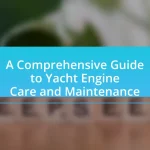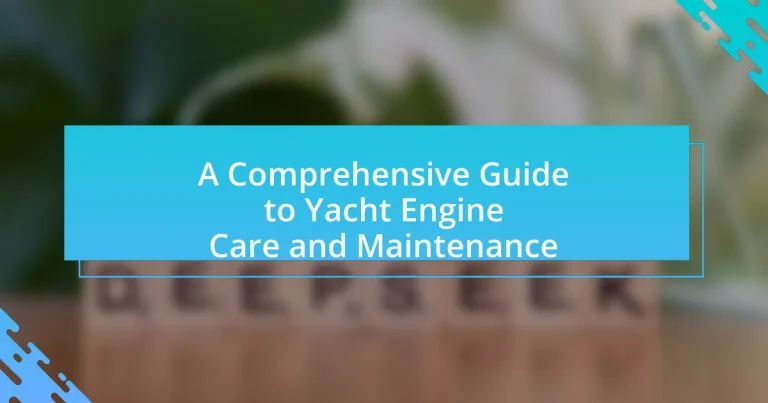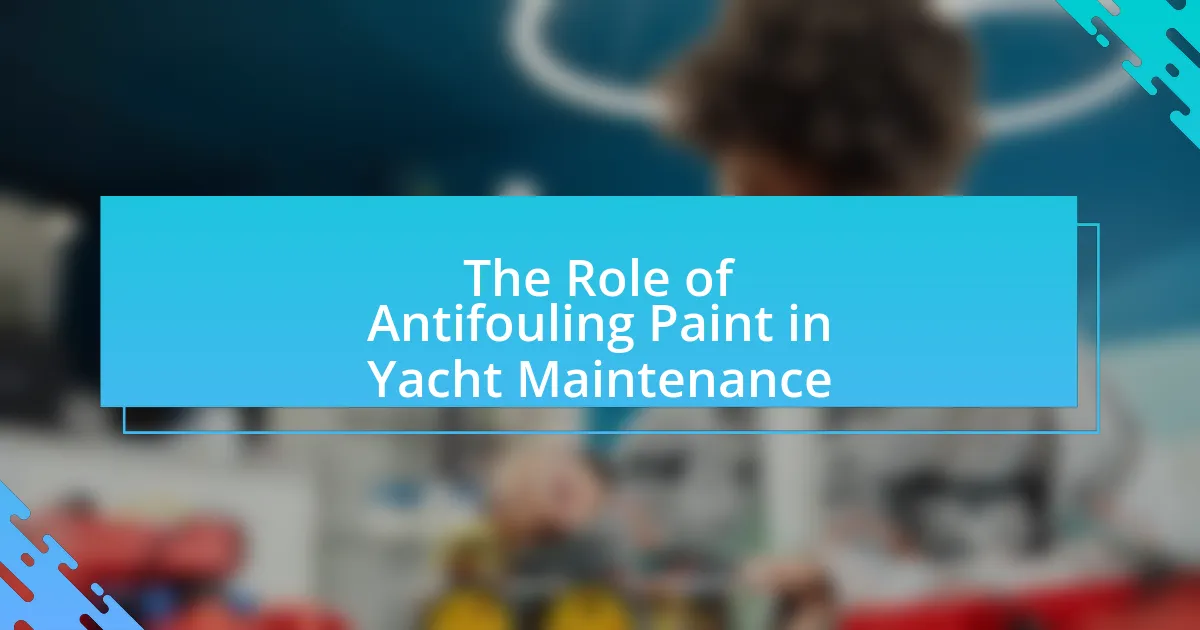Yacht engine care and maintenance encompasses systematic practices aimed at ensuring the optimal performance and longevity of yacht engines. Key components of maintenance include regular inspections, oil changes, coolant checks, and the replacement of filters and belts, which are crucial for preventing mechanical failures. The article highlights the importance of adhering to a maintenance schedule, as neglect can lead to costly repairs and safety hazards. It also discusses the types of engines commonly used in yachts, their specific maintenance needs, and best practices for daily checks and seasonal preparations. Additionally, it provides troubleshooting tips for common engine issues and emphasizes the significance of fuel quality and regular oil changes in maintaining engine efficiency.
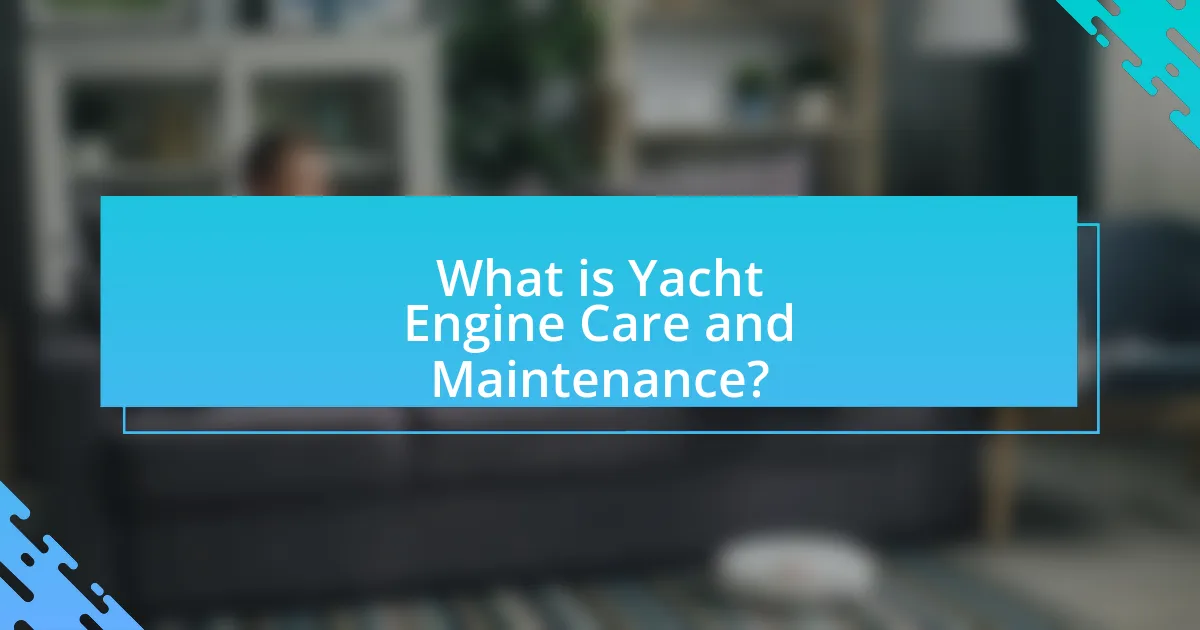
What is Yacht Engine Care and Maintenance?
Yacht engine care and maintenance refers to the systematic practices involved in ensuring the optimal performance and longevity of a yacht’s engine. This includes regular inspections, oil changes, coolant checks, and the replacement of filters and belts, which are essential for preventing mechanical failures. According to the American Boat and Yacht Council, routine maintenance can extend engine life by up to 50%, highlighting the importance of adhering to a maintenance schedule.
Why is proper yacht engine care essential?
Proper yacht engine care is essential to ensure optimal performance and longevity of the engine. Regular maintenance, such as oil changes and inspections, prevents mechanical failures and enhances fuel efficiency. According to the American Boat and Yacht Council, neglecting engine care can lead to costly repairs and safety hazards, as engines that are not properly maintained are more prone to breakdowns and accidents at sea.
What are the consequences of neglecting engine maintenance?
Neglecting engine maintenance can lead to severe consequences, including reduced engine performance, increased fuel consumption, and potential engine failure. When regular maintenance tasks, such as oil changes, filter replacements, and inspections, are overlooked, the engine may accumulate dirt and debris, causing wear and tear on critical components. According to the American Automobile Association, poorly maintained engines can lose up to 25% of their efficiency, resulting in higher operational costs and decreased reliability. Additionally, neglect can lead to costly repairs, as minor issues can escalate into major failures if not addressed promptly.
How does regular maintenance extend engine life?
Regular maintenance extends engine life by ensuring optimal performance and preventing wear and tear. Routine tasks such as oil changes, filter replacements, and inspections help identify and address potential issues before they escalate into major problems. For instance, according to the American Automobile Association, regular oil changes can increase engine life by up to 50%. Additionally, maintaining proper coolant levels and checking belts and hoses can prevent overheating and mechanical failures, further contributing to the longevity of the engine.
What are the key components of yacht engines?
The key components of yacht engines include the engine block, cylinder head, pistons, crankshaft, camshaft, fuel system, cooling system, lubrication system, and exhaust system. The engine block serves as the main structure housing the cylinders, while the cylinder head contains the combustion chambers and valves. Pistons move within the cylinders to convert fuel energy into mechanical energy, and the crankshaft translates this motion into rotational power. The camshaft controls the timing of valve openings and closings.
The fuel system delivers fuel to the engine, ensuring optimal combustion, while the cooling system prevents overheating by circulating coolant. The lubrication system reduces friction between moving parts, and the exhaust system expels combustion gases. Each component plays a critical role in the engine’s overall performance and efficiency, making them essential for the proper functioning of yacht engines.
What types of engines are commonly used in yachts?
Yachts commonly use two main types of engines: inboard engines and outboard engines. Inboard engines are typically installed within the hull of the yacht and are often diesel-powered, providing greater torque and efficiency for larger vessels. Outboard engines, on the other hand, are mounted externally on the transom and are usually gasoline-powered, offering ease of maintenance and portability for smaller yachts. According to the International Council of Marine Industry Associations, the choice between inboard and outboard engines often depends on the yacht’s size, intended use, and performance requirements.
How do different engine types affect maintenance needs?
Different engine types significantly affect maintenance needs due to their design, complexity, and operational requirements. For instance, diesel engines typically require more frequent oil changes and fuel filter replacements compared to gasoline engines, which often have simpler fuel systems. Additionally, two-stroke engines demand more regular maintenance due to their higher wear rates and the need for oil mixing with fuel, while four-stroke engines generally have longer intervals between maintenance tasks. The specific maintenance schedules are often outlined in manufacturer guidelines, which indicate that neglecting these requirements can lead to decreased performance and increased repair costs over time.
What are the basic principles of yacht engine maintenance?
The basic principles of yacht engine maintenance include regular inspections, timely oil changes, and proper cooling system management. Regular inspections help identify potential issues before they escalate, ensuring the engine operates efficiently. Timely oil changes are crucial as they prevent engine wear and maintain optimal performance; for instance, changing the oil every 100 hours of operation or at least once a year is a common recommendation. Proper cooling system management, which involves checking coolant levels and inspecting hoses, prevents overheating and extends engine life. These principles are essential for maintaining the reliability and longevity of yacht engines.
How often should routine maintenance be performed?
Routine maintenance should be performed at least every 100 hours of engine operation or annually, whichever comes first. This frequency is recommended to ensure optimal performance and longevity of yacht engines, as regular checks can identify potential issues before they escalate. According to the American Boat and Yacht Council, adhering to this maintenance schedule can significantly reduce the risk of engine failure and enhance safety on the water.
What are the critical checks during routine maintenance?
Critical checks during routine maintenance of yacht engines include inspecting the oil levels, checking the coolant levels, examining fuel filters, and assessing the condition of belts and hoses. These checks ensure optimal engine performance and prevent potential failures. For instance, maintaining proper oil levels is crucial as low oil can lead to engine wear or damage, while regular inspection of fuel filters prevents clogging that can disrupt fuel flow. Additionally, monitoring coolant levels helps avoid overheating, and inspecting belts and hoses can prevent breakdowns due to wear or leaks.
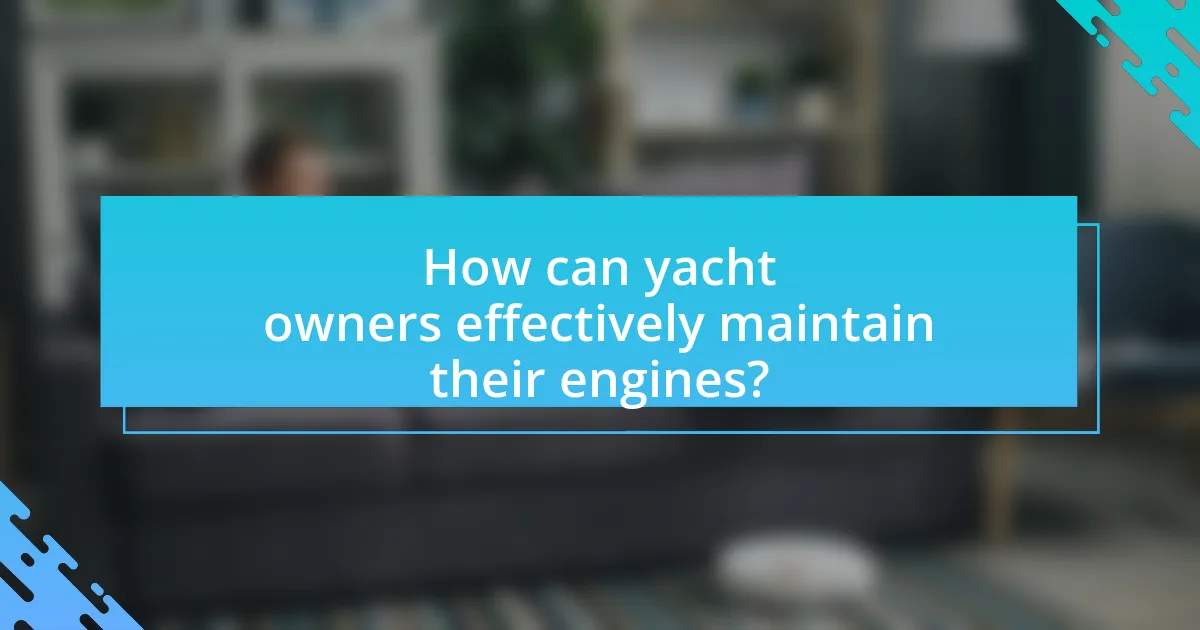
How can yacht owners effectively maintain their engines?
Yacht owners can effectively maintain their engines by adhering to a regular maintenance schedule that includes routine inspections, oil changes, and cooling system checks. Regular inspections help identify potential issues early, while changing the engine oil every 100 hours of operation or at least once a year ensures optimal lubrication and performance. Additionally, checking the cooling system for leaks and ensuring the coolant is at the proper level prevents overheating, which is critical for engine longevity. Following these practices can significantly reduce the risk of engine failure and extend the lifespan of the yacht’s engine.
What are the best practices for daily engine checks?
The best practices for daily engine checks include inspecting fluid levels, examining belts and hoses, checking for leaks, and ensuring the battery is secure and charged. Regularly checking oil, coolant, and fuel levels helps maintain optimal engine performance and prevents potential issues. Additionally, visually inspecting belts for wear and hoses for cracks ensures reliability during operation. Monitoring for any signs of leaks can prevent environmental damage and costly repairs. Finally, confirming that the battery connections are tight and that the battery is charged is crucial for engine start-up. These practices are essential for maintaining the health and efficiency of yacht engines, as neglecting them can lead to significant mechanical failures.
How can visual inspections prevent major issues?
Visual inspections can prevent major issues by identifying potential problems early, allowing for timely maintenance and repairs. Regular visual checks of yacht engines can reveal signs of wear, leaks, or corrosion that, if left unaddressed, could lead to catastrophic failures. For instance, a study by the Marine Industry Association found that 70% of engine failures could be traced back to overlooked visual signs. By conducting routine inspections, yacht owners can mitigate risks, enhance safety, and prolong the lifespan of their engines.
What should be monitored during engine operation?
During engine operation, critical parameters such as oil pressure, coolant temperature, fuel levels, and exhaust temperature should be monitored. Monitoring oil pressure ensures proper lubrication, preventing engine wear and potential failure. Coolant temperature is vital for avoiding overheating, which can lead to engine damage. Fuel levels must be checked to ensure adequate supply for operation, while exhaust temperature monitoring helps identify combustion efficiency and potential issues. These parameters are essential for maintaining optimal engine performance and longevity.
How can yacht owners prepare for seasonal maintenance?
Yacht owners can prepare for seasonal maintenance by creating a detailed checklist that includes inspecting the engine, checking fluid levels, and cleaning the hull. This preparation ensures that all critical components are functioning properly before the boating season begins. For instance, regular engine inspections can prevent costly repairs, as studies show that proactive maintenance can extend engine life by up to 50%. Additionally, checking fluid levels, such as oil and coolant, is essential to avoid overheating and engine failure. Cleaning the hull not only improves performance but also enhances fuel efficiency, as a clean hull can reduce drag by approximately 10%.
What specific tasks should be completed before winter storage?
Before winter storage, it is essential to complete tasks such as draining the fuel system, changing the oil and oil filter, and winterizing the cooling system. Draining the fuel system prevents fuel degradation and potential engine damage, while changing the oil removes contaminants that could harm the engine during storage. Winterizing the cooling system, which includes flushing with antifreeze, protects against freezing and corrosion. These tasks are critical for maintaining engine integrity and ensuring reliable performance when the yacht is re-commissioned.
How can owners ensure engines are ready for the sailing season?
Owners can ensure engines are ready for the sailing season by conducting a thorough pre-season inspection and maintenance routine. This includes checking and changing the engine oil, inspecting fuel filters, and ensuring the cooling system is functioning properly. Regular maintenance, such as replacing worn belts and hoses, is crucial for optimal engine performance. Additionally, testing the battery and electrical systems ensures reliability during use. According to the American Boat and Yacht Council, following a systematic maintenance checklist can significantly reduce the risk of engine failure while sailing.
What tools and resources are essential for yacht engine maintenance?
Essential tools and resources for yacht engine maintenance include a comprehensive toolkit, engine oil and filters, coolant, fuel additives, a multimeter, and a manual specific to the engine model. A comprehensive toolkit typically consists of wrenches, screwdrivers, pliers, and sockets, which are necessary for various mechanical tasks. Engine oil and filters are crucial for lubrication and maintaining engine health, while coolant prevents overheating. Fuel additives can enhance performance and prevent fuel system issues. A multimeter is essential for diagnosing electrical problems, and having a manual specific to the engine model provides vital information for maintenance procedures and specifications. These tools and resources ensure effective maintenance and longevity of yacht engines.
What basic tools should every yacht owner have on board?
Every yacht owner should have essential tools on board, including a multi-tool, screwdrivers, wrenches, pliers, a hammer, a tape measure, and a first aid kit. These tools are crucial for performing routine maintenance and repairs, ensuring the yacht operates safely and efficiently. For instance, a multi-tool can address various tasks, while screwdrivers and wrenches are necessary for tightening or loosening components. Having these tools readily available can prevent minor issues from escalating into major problems, thus supporting effective yacht engine care and maintenance.
Where can owners find reliable maintenance guides and manuals?
Owners can find reliable maintenance guides and manuals through official manufacturer websites, specialized marine publications, and online forums dedicated to yacht maintenance. Official manufacturer websites often provide downloadable manuals specific to each engine model, ensuring accuracy and relevance. Specialized marine publications, such as “Yachting Magazine” and “Practical Boat Owner,” frequently feature articles and guides on engine care. Additionally, online forums like “YachtForums” and “The Hull Truth” offer community-driven insights and shared experiences, which can be valuable for practical maintenance advice.
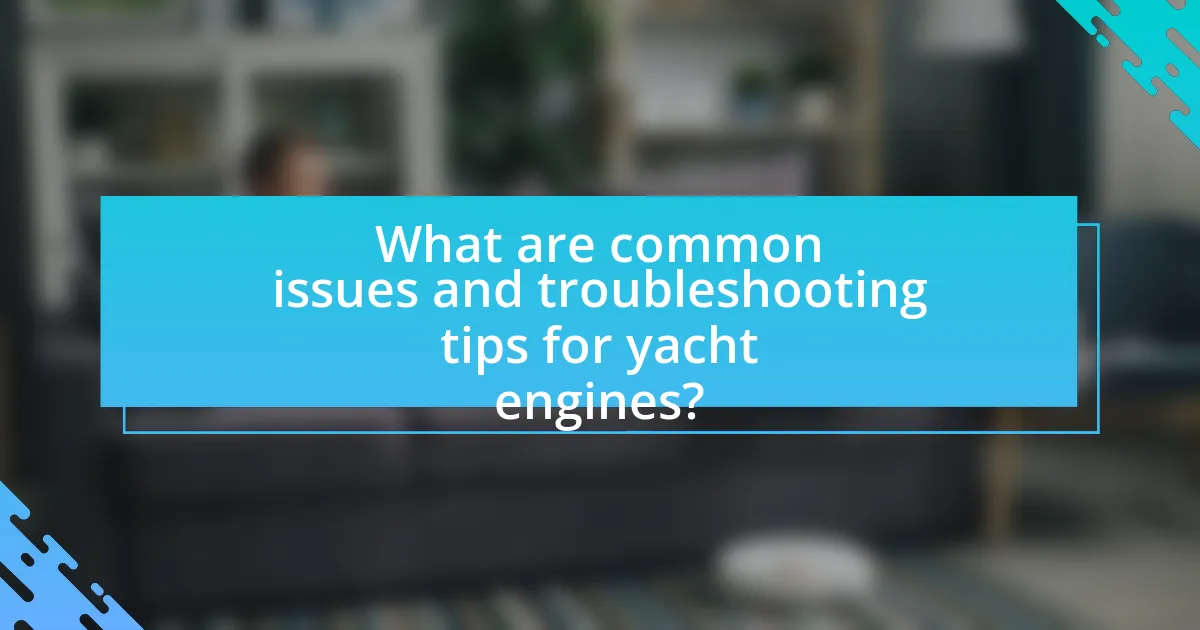
What are common issues and troubleshooting tips for yacht engines?
Common issues with yacht engines include overheating, fuel system problems, electrical failures, and oil leaks. Overheating often results from a blocked cooling system or low coolant levels; checking the coolant and ensuring the cooling system is clear can resolve this. Fuel system problems, such as clogged filters or contaminated fuel, can be addressed by replacing filters and using clean fuel. Electrical failures may stem from corroded connections or dead batteries; inspecting wiring and ensuring battery health can mitigate these issues. Oil leaks typically indicate worn seals or gaskets, which should be replaced to prevent further damage. Regular maintenance and inspections can help identify these issues early, ensuring the yacht engine operates efficiently.
What are the most frequent engine problems yacht owners face?
Yacht owners frequently face engine problems such as overheating, fuel system issues, and electrical failures. Overheating can occur due to inadequate cooling, often caused by clogged sea strainers or malfunctioning water pumps. Fuel system issues, including clogged filters or contaminated fuel, can lead to poor engine performance or stalling. Electrical failures, often stemming from corroded connections or dead batteries, can disrupt engine operation. According to a survey by the Yacht Industry Association, these problems account for over 60% of engine-related issues reported by yacht owners, highlighting their prevalence in yacht maintenance.
How can overheating be diagnosed and resolved?
Overheating in yacht engines can be diagnosed by checking the engine temperature gauge, inspecting coolant levels, and examining the water intake for blockages. If the gauge indicates high temperatures, low coolant levels are often a sign of leaks or evaporation, while blockages in the water intake can prevent proper cooling.
To resolve overheating, first, ensure the coolant system is filled to the appropriate level and check for leaks in hoses or connections. If coolant levels are adequate, inspect the water pump for functionality and clear any debris obstructing the intake. Additionally, cleaning or replacing the engine’s heat exchanger can improve cooling efficiency. Regular maintenance, including checking the coolant and ensuring the water intake is clear, can prevent overheating issues.
What steps should be taken if the engine fails to start?
If the engine fails to start, first check the battery connections to ensure they are secure and free of corrosion. A loose or corroded connection can prevent the engine from receiving power. Next, inspect the fuel supply to confirm that there is adequate fuel in the tank and that the fuel lines are not blocked or damaged. Additionally, examine the ignition system, including the spark plugs, to verify they are functioning properly. If these components are in order and the engine still does not start, consult the owner’s manual for troubleshooting specific to the engine model, as it may provide further diagnostic steps or indicate if professional assistance is required.
How can yacht owners troubleshoot engine performance issues?
Yacht owners can troubleshoot engine performance issues by systematically checking fuel supply, air intake, and exhaust systems. First, ensure that the fuel is clean and free from contaminants, as dirty fuel can lead to poor engine performance. Next, inspect the air filters for blockages, as restricted airflow can hinder engine efficiency. Additionally, examine the exhaust system for any obstructions that may affect engine output. Regular maintenance, such as changing oil and filters, is crucial, as neglecting these tasks can lead to performance degradation. According to the American Boat and Yacht Council, routine checks and maintenance can prevent up to 80% of engine-related issues, highlighting the importance of proactive care in maintaining optimal engine performance.
What signs indicate fuel system problems?
Signs that indicate fuel system problems include engine stalling, difficulty starting the engine, reduced engine power, and fuel leaks. Engine stalling often occurs due to inadequate fuel supply, while difficulty starting can signal issues with the fuel pump or clogged filters. Reduced engine power may indicate fuel starvation or contamination, and visible fuel leaks suggest a compromised fuel line or connection. These symptoms are critical indicators that warrant immediate attention to prevent further damage to the yacht’s engine.
How can electrical issues be identified and fixed?
Electrical issues can be identified and fixed through systematic troubleshooting and testing of components. Start by checking for visible signs of damage, such as frayed wires or burnt connectors, which can indicate a problem. Use a multimeter to measure voltage, continuity, and resistance in circuits, ensuring that power is reaching all necessary components. If a specific device is malfunctioning, isolate it from the system and test it independently to determine if it is the source of the issue.
For example, if a yacht’s navigation lights are not functioning, inspect the wiring and connections first, then test the bulbs and switches. According to the National Fire Protection Association, improper electrical connections are a leading cause of marine fires, highlighting the importance of thorough inspections and repairs. By following these steps, electrical issues can be effectively identified and resolved, ensuring safe and reliable operation of yacht systems.
What are the best practices for maintaining yacht engine efficiency?
To maintain yacht engine efficiency, regular maintenance practices such as changing oil and filters, monitoring fuel quality, and ensuring proper cooling system function are essential. Regular oil changes, typically every 100 hours of operation or annually, help prevent engine wear and maintain lubrication. Monitoring fuel quality is crucial, as contaminated fuel can lead to engine performance issues; using fuel additives can mitigate this risk. Additionally, ensuring the cooling system is functioning properly, including checking coolant levels and inspecting hoses for leaks, prevents overheating and maintains optimal engine temperature. These practices collectively enhance engine performance and longevity, supported by industry standards that emphasize routine maintenance for marine engines.
How does regular oil change impact engine performance?
Regular oil changes significantly enhance engine performance by ensuring optimal lubrication and reducing friction among engine components. Fresh oil maintains its viscosity and protective properties, which helps prevent wear and tear, overheating, and sludge buildup. According to the American Petroleum Institute, using the correct oil and changing it regularly can improve fuel efficiency by up to 2% to 5%, directly impacting overall engine performance. Additionally, clean oil aids in better engine responsiveness and longevity, as it effectively carries away contaminants and debris that could otherwise hinder engine function.
What role does fuel quality play in engine maintenance?
Fuel quality is crucial for engine maintenance as it directly affects engine performance, efficiency, and longevity. High-quality fuel ensures optimal combustion, reducing the formation of deposits and contaminants that can lead to engine wear and malfunctions. For instance, using fuel with the correct octane rating prevents knocking, while clean fuel minimizes the risk of clogging fuel injectors and filters. Studies indicate that poor fuel quality can lead to a decrease in fuel efficiency by up to 30%, resulting in increased operational costs and more frequent maintenance needs. Therefore, maintaining high fuel quality is essential for ensuring reliable engine operation and minimizing maintenance issues.
What are the top tips for effective yacht engine care?
The top tips for effective yacht engine care include regular maintenance, monitoring fluid levels, and ensuring proper ventilation. Regular maintenance involves scheduled inspections and servicing according to the manufacturer’s guidelines, which can prevent costly repairs and extend engine life. Monitoring fluid levels, such as oil and coolant, is crucial as low levels can lead to overheating or engine failure. Proper ventilation is essential to prevent overheating; ensuring that air intake and exhaust systems are unobstructed allows for optimal engine performance. These practices are supported by industry standards that emphasize the importance of routine checks and adherence to maintenance schedules for marine engines.
How can yacht owners create a maintenance schedule?
Yacht owners can create a maintenance schedule by identifying key maintenance tasks, determining their frequency, and documenting them in a calendar format. Essential tasks include engine oil changes, fuel system checks, and hull cleaning, which should be performed at regular intervals based on manufacturer recommendations and usage patterns. For instance, the American Boat and Yacht Council suggests changing engine oil every 100 hours of operation or annually, whichever comes first. By organizing these tasks into a structured timeline, yacht owners can ensure timely maintenance, prolonging the lifespan of their vessel and enhancing safety.
What resources are available for ongoing education in engine care?
Online courses, workshops, and certification programs are available for ongoing education in engine care. Institutions like the American Boat and Yacht Council (ABYC) offer courses that cover various aspects of marine engine maintenance and repair. Additionally, organizations such as the National Marine Manufacturers Association (NMMA) provide resources and training materials focused on engine care. Furthermore, online platforms like Coursera and Udemy feature courses on marine engineering and maintenance, allowing individuals to learn at their own pace. These resources ensure that individuals can stay updated with the latest practices and technologies in engine care.











